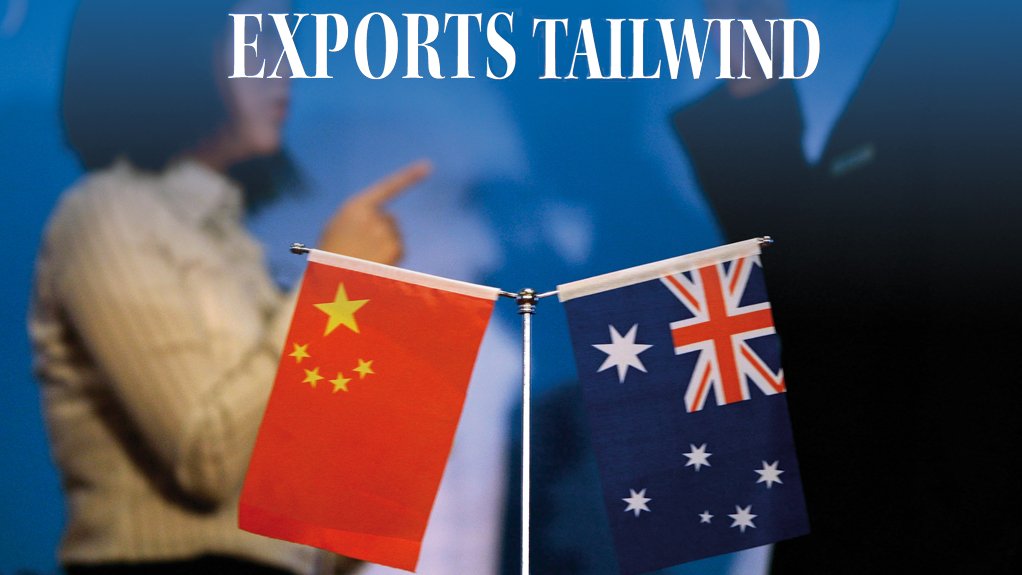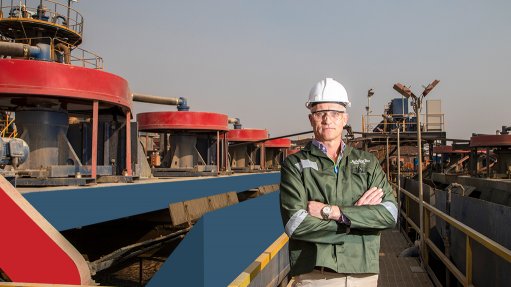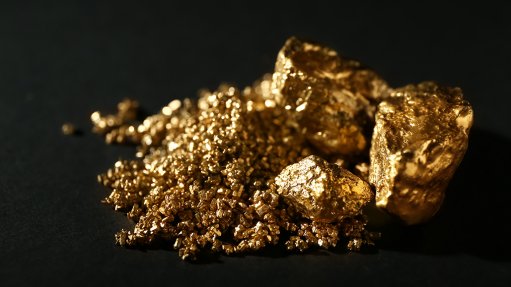Free-trade pact to offer Australian miners improved access to Chinese market
PERTH (miningweekly.com) – While commodity prices are in a downward slump, causing resource firms to slash costs, and, in some cases, curb output, Australia’s recent free-trade agreement (FTA) with China is expected to offer some relief.
In June this year, the Australian government inked an FTA with its largest trading partner, which accounted for some A$160-billion in exports in 2013/14.
Prime Minister Tony Abbott said in June that the agreement secured better market access for Australia to the world’s second-largest economy, improved the country’s competitive position in a rapidly growing market, and promoted increased two-way investment and reduced import costs.
The Australian resources sector, which accounts for some A$1.3-billion in exports, is expected to benefit significantly from the FTA, as tariffs will be removed from nearly all Australian resources and energy products, including an 8% tariff on aluminium oxide.
A 3% tariff on coking coal will be removed on the first day that the FTA becomes effective, and the 6% tariff on thermal coal will be phased out over the next two years.
The agreement will eliminate tariffs that add nearly A$600-million a year in costs to the bilateral minerals and energy trade.
China’s Massive Demand
Over the past decade, China’s surging economy and investment in heavy industries and infrastructure have been the most significant factor driving the resources boom.
The Asian nation is now the world’s largest coal importer, accounting for around one-fifth of global imports, which is a considerable feat, considering the country was a small net exporter in 2008.
China is also the largest importer of copper, accounting for some 35% of global imports, a further 60% of the world’s manganese imports, and up to 65% of all aluminium and iron-ore imports.
Recent figures from the Office of the Chief Economist noted that Australia’s iron-ore exports to China increased by 6% year-on-year to 155-million tonnes in the quarter ended June 30. Although China’s iron-ore imports decreased by 4% year-on-year to 226-million tonnes in the quarter, Australia’s share of these imports continued to increase, growing from 59% in the second quarter of 2014 to 65% in the quarter under review.
Australia exported some 10.8-million tonnes of metallurgical coal to China during the same period, along with ten-million tonnes of thermal coal, while some 1.3-million tonnes of liquefied natural gas (LNG), valued at A$433-million, was also exported to China during the same period.
However, as China’s growth rate slows down, from the 8% a year achieved over the last few years to between 4% and 5% a year in the 2020s, and perhaps to half that in the 2030s, the country’s consumption of raw materials is slated to slow down as the economy becomes more resource-intensive and investment- and consumption-led.
A report commissioned by the Minerals Council of Australia (MCA) has found that an FTA between China and Australia would be the best available option for advancing Australia’s broader commercial interests with the country’s largest trading partner, including advancing its interest in minerals and energy and related services in investment.
The report, titled ‘China: Minerals and Energy and the China-Australia Free Trade Agreement’, states that the FTA provides for substantial liberalisation of trade and investment, which will deepen bilateral economic integration, eliminating all tariffs on minerals and energy exports to China within four years of entry into force.
For Australian firms interested in stepping into China, the FTA guarantees that mining- related services can be delivered through a commercial presence in China, and that domestic reforms will be incorporated into the agreement on a rolling basis. It further guarantees access to technical consulting and field services linked to local coal-bed methane and shale gas extraction, and encourages cooperation with Chinese partners in developing iron-ore, copper and manganese resources.
Certain approval processes are also being streamlined, with more decision-making at local level.
Three other provisions of the FTA also have implications for the Australian minerals and energy sector. The first is a ban on the use of export subsidies, while the second establishes a review mechanism to address nontariff impedi- ments, such as product standards, import licensing requirements and border processing arrangements, on a case-by-case basis.
The third provision, through a memorandum of understanding alongside the FTA, will allow Chinese investor operating companies registered in Australia to secure the skilled professionals they need to run their Australian projects.
This last provision will only be available to projects valued at over A$150-million and will operate within the country’s current 457 visa system. It will also not allow the undermining of Australia’s employment laws and wage conditions.
It is this condition of the FTA that has worker unions concerned, with the Construction, Forestry, Mining and Energy Union warning that this clause would threaten Australian jobs at a time of high unemployment, while the FTA as a whole would place Australian manufacturers at a competitive disadvantage, while allowing unsafe products to flood the market.
The Department of Foreign Affairs and Trade has been quick to respond, noting that the current working visa requirements will remain in place, and that unskilled or underpaid Chinese workers will not be brought into a project.
The government department points out that Chinese workers will also only be sourced when suitable local workers can not be found, with Australian workers given preference, consistent with existing practices.
MCA CEO Brendan Pearson has come out in defence of the FTA, saying it is an unambigu- ously good deal for Australia, and will deliver stronger economic growth, more jobs and better living standards.
“The FTA is a living agreement that provides for further rounds of liberalisation as well as review processes to ensure that the gains from the agreement are not circumvented by so-called nontariff barriers,” Pearson says.
The FTA has also garnered the support of mining heavyweight BHP Billiton, with the company’s CEO, Andrew Mackenzie, recently saying that initiatives promoting open trade were “absolutely necessary” amid volatility and global market uncertainties, if Australia wished to lift productivity and compete on the international stage.
“As a small, open economy built on trade, Australia relies on access to foreign markets for goods, services and capital to invest in our future, and on competitive, export- capable Australian businesses for continued prosperity.
“Free-trade agreements can play an important role in improving Australia’s access to new, developing and mature markets. And, as a trading nation emerging from the latest ‘mining boom’, we can’t labour under any misconceptions that customers in China will take our commodities at any price,” Mackenzie said in a comment piece published in The Australian last month.
Mackenzie noted that the FTA would allow Australian resource companies to tap into a more mature Chinese market at a time when assistance was needed most.
Further, the projected A$600-million tariff savings would be crucial for the Australian resources sector, specifically the coal sector, where profit margins are being squeezed by depressed prices, compounded by competition from countries already enjoying zero tariffs from FTAs already in place.
“The FTA puts the Australian resources sector back on a level playing field,” Mackenzie said.
He added that the FTA would also allow for deeper links between Australian and Chinese officials, which would assist in resolving hidden nontariff barriers constraining trade and exports, such as at-the-border red tape, anticompetitive regulation and infrastructure bottlenecks that could cause friction and wastage in the global supply chain.
“These barriers make trading inefficient and, in some cases, impossible, and are a drag on competitiveness. Australian businesses can achieve a great deal through productivity improvements. [However], if our ships remain idle in international ports owing to poor infrastructure or opaque regulations, then our efforts to lift productivity at home will mean little and our competitive position will be damaged.”
Once passed through Parliament, it is hoped that the FTA with China will yield the same benefits that Australia is seeing in its FTAs with Korea and Japan, both of which are only months old. Already, these agreements have seen a significant increase in Australian exports, including frozen beef, macadamias, wine, horticultural products and several others.
Comments
Press Office
Announcements
What's On
Subscribe to improve your user experience...
Option 1 (equivalent of R125 a month):
Receive a weekly copy of Creamer Media's Engineering News & Mining Weekly magazine
(print copy for those in South Africa and e-magazine for those outside of South Africa)
Receive daily email newsletters
Access to full search results
Access archive of magazine back copies
Access to Projects in Progress
Access to ONE Research Report of your choice in PDF format
Option 2 (equivalent of R375 a month):
All benefits from Option 1
PLUS
Access to Creamer Media's Research Channel Africa for ALL Research Reports, in PDF format, on various industrial and mining sectors
including Electricity; Water; Energy Transition; Hydrogen; Roads, Rail and Ports; Coal; Gold; Platinum; Battery Metals; etc.
Already a subscriber?
Forgotten your password?
Receive weekly copy of Creamer Media's Engineering News & Mining Weekly magazine (print copy for those in South Africa and e-magazine for those outside of South Africa)
➕
Recieve daily email newsletters
➕
Access to full search results
➕
Access archive of magazine back copies
➕
Access to Projects in Progress
➕
Access to ONE Research Report of your choice in PDF format
RESEARCH CHANNEL AFRICA
R4500 (equivalent of R375 a month)
SUBSCRIBEAll benefits from Option 1
➕
Access to Creamer Media's Research Channel Africa for ALL Research Reports on various industrial and mining sectors, in PDF format, including on:
Electricity
➕
Water
➕
Energy Transition
➕
Hydrogen
➕
Roads, Rail and Ports
➕
Coal
➕
Gold
➕
Platinum
➕
Battery Metals
➕
etc.
Receive all benefits from Option 1 or Option 2 delivered to numerous people at your company
➕
Multiple User names and Passwords for simultaneous log-ins
➕
Intranet integration access to all in your organisation





















